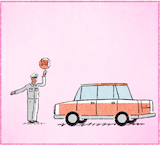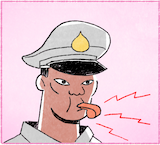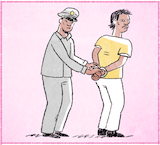



นี้คือตำหลวด
ตำหลวดเขาเฮ็ดอี่หยัง ตำหลวดกะมีหน้าที่ดูแลปะชาชน เบิ่งแญงปะชาชน ซ่อยเหลียปะชาชน
เป็นอาซีบตำหลวดกะเฮ็ดหลายหน้าที่ กะซ่อยเหลียทุกอย่างเกี่ยวกับซ่อยเหลียปะชาชน
ตำหลวดเขาใส่ซุดสีหญัง ตำหลวดสิใส่ซุดสีกากี หลือว่าสีน้ำตานเข้มๆ
2
เขากำลังเฮ็ดหญัง ตำหลวดเขากำลังเฮ็ดอี่หยัง เขากำลังโบกมือ
เขากำลังโบกมือให้สันญะลักกับคนขับลดว่าให้จอด ว่าให้หยุด ว่าให้จอดอยู่หม้องนี้
ขั้นตำหลวดบอกให้หยุด บอกให้ลดจอด ลดสิจอดบ่ กะจอด ลดคันนั้นกะต้องจอด ขั้นตำหลวดบอกหยุด กะต้องหยุด ขั้นตำหลวดบอกจอด กะต้องจอด
3
เขากำลังเฮ็ดหญัง เขากำลังเป่าลูกหวีด
เขาเป่าลูกหวีดเฮ็ดหญัง เขาอาดสิเป่าให้สันญะลักกะได้ว่าต้องเฮ็ดอี่หยัง ว่าต้องเฮ็ดแบบนั้น ว่าต้องเฮ็ดแบบนี้ เพื่อที่ว่าสิให้คนได้ญินนั้น ได้ฟังเจ้าของ หลือว่าได้ญินเจ้าของนั้นหละ
แล้วคนที่เป่านี้เขาเป็นใผ เขามีหน้าที่เฮ็ดหญัง เขาเป็นตำหลวด พุซายคนนี้เขาเป็นตำหลวด เขาอาดสิมีหน้าที่เบิ่งแญง หลือว่าดูแลอยู่เทิงท้องถะหนนกะได้ เขากะเลยต้องเป่าลูกหวีด
4
ตำหลวดเขากำลังเฮ็ดหญัง ตำหลวดเขากำลังจับพุล้าย เขากำลังจับคนล้าย
คนล้ายเขาเป็นใผ คนล้ายกะเป็นคนคือกัน แต่ว่าเขาอาดสิเฮ็ดผิดกดหมาย หลือว่าเฮ็ดในทางที่บ่ดี เฮ็ดในสิ่งที่บ่ดี เขากะเลยต้องถืกจับ ถืกตำหลวดจับ
แล้วตำหลวดเอาอี่หยังใส่มือพุล้าย กะเป็นกุนแกข้อมือ เอาไว้ถ้าใส่มือพุล้าย หลือว่าเอาไว้ถ้าล็อกมือพุล้ายให้มือเขาติดกัน หลือว่าให้มือเขาอยู่ใก้ๆ กัน เพื่อที่ว่าเขาสิบ่ได้ทำล้ายตำหลวด หลือว่าเพื่อที่ว่าเขาสิบ่ได้ทำล้ายคนอื่นเนาะ
Link to overview page
Link to dictionary
| Isaan | Pronunciation | Tones | Thai | English/Notes |
|---|---|---|---|---|
| นี้ | ni: | HF | นี้ | 1. this 2. here |
| คือ | khʉ: | HR | คือ | 1. to be, to resemble, like, as 2. why {บักหล้าคือบ่เก็บโต่ะแน่ = [addressing a young boy] Why haven't you cleared the table?} |
| ตำหลวด | tam-lu:at | M-LF | ตำรวจ | 1. police 2. policeman |
| เขา | khao | M | เขา | personal pronoun: he, she |
| เฮ็ด | het | H | ทำ | to do, to make |
| อี่หยัง | i:-yaŋ | H-M | อะไร | 1. what {นี้คืออี่หยัง = What is this?} {มื้อนี้เจ้าเฮ็ดอี่หยัง = What are you doing today?} {กินเข้างายกับอี่หยัง = What did you have for breakfast?} 2. something, anything, (in negations) nothing {บ่ต้องเฮ็ดอี่หยังอีกเลยนอกจากใส่ปุย = [we] don't need to do anything besides adding fertilizer} |
| กะ | ga | M | ก็ | 1. then, consequently 2. also |
| มี | mi: | HR | มี | 1. to have 2. there is |
| หน้าที่ | na:-thi: | LF-H | หน้าที่ | duty, responsibility, obligation, function |
| ดูแล | du:-lɛ: | M-HR | ดูแล | to take care of, to look after |
| ปะชาชน | pa-cha:-chon | M-HR-HR | ประชาชน | people, population, general public |
| เบิ่งแญง | bəŋ-ɲɛ:ŋ | H-HR | 1. to oversee, to supervise 2. to look after, to keep an eye on |
|
| ซ่อยเหลีย | sɔ:i-li:a | H-M | ช่วยเหลือ | to help, to assist Notes: pronunciation: also realized as ซ่อยเหลือ |
| เป็น | pen | M | เป็น | 1. to be, to exist 2. to be able to 3. to suffer, sth. happens to 4. เป็นหญัง[...]คือ in initial position: why? {เป็นหญังเขากะคือแปงฟัน = Why is he brushing his teeth?} {เป็นหญังเคี่ยงบินมันคือสิตก = Why is the airplane falling down?} |
| อาซีบ | a:-si:p | M-HF | อาชีพ | profession, occupation Notes: pronunciation: also realized as อาชีพ |
| หลาย | la:i | M | เยอะ, มาก | many, much, very |
| ทุก | thuk | H | ทุก | every Notes: also pronounced ทุ as in ทุมื้อๆ = everyday, always |
| อย่าง | ya:ŋ | H | อย่าง | type, kind, sort, category |
| เกี่ยวกับ | gi:ao-gap | H-M | เกี่ยวกับ | about, regarding, pertaining to |
| ใส่ | sai | H | ใส่ | 1. to put something in/on {เขาใส่บักพิกในกวยเตียวหลาย = he's putting a lot of chili in his noodle soup} {เขาบีบยาสีฟันใส่แปงสีฟัน = he squeezes toothpaste on the toothbrush} {ก่องเอาไว้ใส่ของ = boxes are there to put stuff in} 2. to wear (clothes) {เขาใส่เสี้ยแขนญาว = he's wearing a long-sleeve} 3. directed at {เอิ้นใส่กัน = to call each other/to say to each other} {หมามันเห่าใส่แมว = the dog barks at the cat} {ล้องเพงใส่ไม = to sing into the microphone} {เขากำลังซี้มือไปใส่พุซาย = she's pointing at the man} |
| ซุด | sut | H | ชุด | dress, uniform {ซุดนักเลียน = school uniform} Notes: pronunciation: also realized as ชุด |
| สี | si: | M | สี | 1. color 2. colored pencil, crayon |
| หญัง | ɲaŋ | M | อะไร, เป็นหญัง = ทำไม | 1. what {เขากำลังเฮ็ดหญัง = What is he doing?} {ธูปเอาไว้เฮ็ดหญัง = What are incense sticks for?} 2. something, anything, (nothing) 3. เป็นหญัง[...]คือ in initial position: why {เป็นหญังเขาคือใส่บักพิกลงไปในกวยเตียว = Why is he putting chili in [his] noodle soup?} {เป็นหญังหน้าต่างมันคือเปิด = Why is the window open?} {เป็นหญังมันคือมีควนไฟ = Why is there smoke?} |
| สิ | si | M | จะ | future tense auxiliary {เขากำลังสิตื่น = he's about to wake up} {สิไปตะหลาด = [I'm] going to the market} |
| กากี | ga:-gi: | M-M | กากี | color: khaki |
| หลือ | lʉ: | M | หรือ | or |
| ว่า | wa: | H | ว่า | 1. that, as {คำว่า X = the word X} 2. to say |
| น้ำตาน | na:m-ta:n | HF-M | น้ำตาล | color: brown |
| เข้ม | khem | LF | เข้ม | intense, strong Notes: pronunciation: also realized with HF tone |
| กำลัง | gam-laŋ | M-HR | กำลัง | auxiliary indicating continuous or progressive action |
| โบก | bo:k | LF | โบก | to wave (the hand) |
| มือ | mʉ: | HR | มือ | 1. hand 2. front leg/paw (e.g., of a cat) |
| ให้ | hai | LF | ให้ | 1. to give {หมอกำลังเอายาให้คนป่วยกิน = the doctor is giving the patient medicine} 2. for 3. to allow, to be allowed |
| สันญะลัก | san-ɲa-lak | M-H-H | สัญลักษณ์ | symbol, mark, sign Notes: tone of second syllable to be verified |
| กับ | gap | M | กับ | 1. and {ลุงกับป้า = uncle and aunt} {กวยเตียวหมูกับกวยเตียวไก่ = noodle soup with pork and noodle soup with chicken} 2. with, to {ค้ายๆ กับคำว่า ... = similar to the word ...} 3. prefix in front of foods {กับเข้า = side dishes eaten with rice} {เขากินกับกวยเตียว = he's eating noodle soup} |
| คน | khon | HR | คน | person, people |
| ขับ | khap | M | ขับ | to drive, to ride |
| ลด | lot | H | รถ | 1. car, motorized vehicle 2. vehicle, cart {ลดขายแนวกิน = food cart} |
| จอด | jɔ:t | LF | จอด | to park, to stop |
| หยุด | yut | M | หยุด | to stop |
| อยู่ | yu: | H | อยู่ | 1. to be (located) at 2. yet, still 3. auxiliary indicating continuous or progressive action {ทอดปาอยู่ในกะทะ = (in the process of) frying a fish in the pan} {แม่กำลังเมี้ยนเฮียนอยู่ = mother is cleaning/tidying up the house} |
| หม้อง | mɔŋ | LF | ที่, แห่ง, บริเวณ | 1. place, area {หลายที่หลายหม้อง = in many places} {หม้องใดหม้องหนึ่ง = some place} 2. clf. for places |
| ขั้น | khan | LF | เมื่อ | when, if |
| บอก | bɔ:k | LF | บอก | to tell, to say, to suggest, to advise |
| บ่ | bɔ: | H | ไม่ | 1. no, not 2. question particle, transforming a statement into a question Notes: spelling exception in line with common usage on social media |
| คัน | khan | HR | คัน | clf. for cars, trains, motorbikes, boats {ลดไฟคันนี้ = this train} {ลดเก็งคันสีเขียวคันน้อย = a small green car} |
| นั้น | nan | HF | นั้น | that, there |
| ต้อง | tɔŋ | HF | ต้อง | to have to, must |
| เป่า | pao | H | เป่า | to blow {เป่าลูกหวีด = to blow a whistle} |
| ลูกหวีด | lu:k-wi:t | HF-LF | นกหวีด | whistle |
| อาด | a:t | LF | อาจ | 1. might, may, will 2. likely |
| ได้ | dai | HF | ได้ | 1. can 2. to get, to obtain 3. before verb: indicating past tense 4. บ่ได้ + verb: not |
| แบบ | bɛ:p | LF | แบบ | 1. example, model, kind 2. style, form, pattern, design |
| เพื่อที่ | phʉ:a-thi: | H-H | เพื่อที่ | in order to, so that Notes: the vowel เอือ is likely to be a Thai loan |
| ได้ญิน | dai-ɲin | HF-HR | ได้ยิน | to hear |
| ฟัง | faŋ | HR | ฟัง | to listen, to hear |
| เจ้าของ | jao-khɔ:ŋ | HF-M | เจ้าของ | 1. personal pronoun: oneself 2. owner |
| นั้นหละ | nan-la | HF-M | นั่นแหละ | auxiliary for emphasis at the end of a phrase |
| แล้ว | lɛ:o | HF | แล้ว | 1. finished 2. already 3. and then, and next (especially แล้วกะ) 4. auxiliary for past tense |
| ที่ | thi: | H | ที่ | 1. that, which {คนที่ยืนอยู่ฝั่งขวา = the person which is standing on the right = the person standing on the right} {เว้าคำที่บ่สุพาบ = to speak words which are impolite = to speak impolitely} 2. for ordinal numbers {ที่สาม = third} |
| ใผ | phai | M | ใคร | 1. who {พุซายคนนี้เป็นใผ = Who's this boy?} 2. somebody, someone, anybody, with negative: nobody {บ่มีใผอยู่หนี้จักคนเลย = there's not a single person here} |
| พุซาย | phu-sa:i | H-HR | ผู้ชาย | man, male |
| เทิง | thə:ŋ | HR | บน | 1. on, on top of, at, in {เทิงโต่ะ = at/on the table} {กบมันนั่งอยู่เทิงใบบัว = the frog is sitting on the lotus leaf} {เทิงท้องฟ้า = in the sky} {มันแล่นอยู่เทิงลาง = [the train] runs on rails} {มีคนนั่งอยู่เทิงลดสามล้อสามคน = there are three people sitting in the tuk tuk} 2. up, upward Notes: pronunciation: also realized as ทัง |
| ท้องถะหนน | thɔ:ŋ-tha-non | HF-M-M | ท้องถนน | road |
| เลย | lə:i | HR | เลย | 1. futher on, beyond, past {เข็มน้อยเลยเลขสิบสองไป = the minute hand has passed number twelve} 2. too much 3. at all 4. definitively 5. completely, utterly |
| จับ | jap | M | จับ | 1. to grasp, to hold {เขาจับมือกัน = they're holding hands} {เขายืนจับไอติมอยู่ = she's standing, holding an ice cream} 2. to catch, to arrest {จับพุล้าย = to arrest a criminal} |
| พุล้าย | phu-la:i | H-HF | ผู้ร้าย | criminal |
| ล้าย | la:i | HF | ร้าย | 1. bad, evil 2. criminal {คนล้าย = criminal} |
| คือกัน | khʉ:-gan | HR-M | เหมือนกัน | 1. also, likewise, similarly {ยินดีที่ได้ฮู้จักคือกันคับ = Nice to meet you too!} 2. in negative sentences: either {บ่ลู้คือกัน = I don't know either} {จักคือกัน = I don't know (either)} |
| แต่ว่า | tɛ:-wa: | H-H | แต่ว่า | 1. but 2. only {ฮู้แต่ว่าเขายืนอยู่พุเดียว = I only know that he's standing there by himself} |
| ผิดกดหมาย | phit-got-ma:i | M-M-M | ผิดกฎหมาย | illegal, against the law |
| ใน | nai | HR | ใน | in, within |
| ทาง | tha:ŋ | HR | ทาง | 1. way, direction {พุหญิงกะสิไปทางหนึ่ง พุซายกะสิไปอีกทางหนึ่ง = the woman goes one way, the man another way} {ตะเว็นไปทางใด = Where has the sun gone?} {เขาถีบจักกะย๊านไปทางหน้า = he's biking on/onward/forward} {มาเว้า มาว่าเฮาในทางที่บ่ดี = he's scolding [me], he's talking to me improperly} 2. by, through, via etc. {เว้าทางโทละสับ = to talk on the phone} |
| ดี | di: | M | ดี | good |
| สิ่ง | siŋ | H | สิ่ง | thing, object |
| ถืก | thʉ:k | LF | ถูก | marker for passive {ขั้นมันถืกความฮ้อนมันกะละลาย = when it is exposed to heat, it melts} {เฮ็ดในสิ่งที่บ่ดี เขากะเลยต้องถืกจับ = [he's] done something bad, so he gets arrested} {กะดาดมันกำลังถืกไฟไหม้ = the paper is burning} |
| เอา | ao | M | เอา | to take, to give {เขากำลังเอาก่องไปซั่ง = he's taking the boxes to weigh them} {หมอกำลังเอายาให้คนป่วยกิน = the doctor is giving medicine to the patient} {เอาไว้ถ้า = is for, is used for, has the purpose of} |
| กุนแกข้อมือ | gun-gɛ:-khɔ:-mʉ: | M-M-LF-HR | กุญแจมือ | handcuff(s) |
| ไว้ถ้า | wai-tha: | HF-LF | usually in a positive statement or answer: is for, is used for, has the purpose of {กะทะมีไว้ถ้าทอด = a pan is for frying} {น้ำบักนาวมีไว้ถ้าปุงอาหาน = lime juice is used to season food} {ปากกามีไว้ถ้าเขียน = a pen is for writing} {กะเทียมเอาไว้ถ้าเฮ็ดแนวกิน = garlic is used to make food} {ขาเอาไว้ถ้าญ่าง = legs are for walking} {เกิบเอาไว้ถ้าใส่ = shoes are for wearing} Notes: see also ไว้ |
|
| ล็อก | lɔk | H | ล็อค | 1. to lock 2. lock (noun) |
| ติด | tit | M | ติด | 1. to be attached to, to be on/at {สะวิดเปิดไฟติดอยู่ข้างฝาบ้าน = the light switch is on the wall} {มันสิมีน้ำติดอยู่โตของเขา = there is water on his body} 2. to stick (to), to attach (to) |
| กัน | gan | M | กัน | mutual, each other, with another, together {เขากำลังนั่งเว้ากัน = they're sitting and talking} {เขาสองคนฮักกัน = they love each other} {ปาสองโตนี้ ใหญ่ห่างกันหลายบ่ = These two fish here, are they very different in size (from each other)?} {ต่างกัน = to be different (from each other)} {ก่องอันไหนหนักกว่ากัน = Which box is heavier (than the other(s))?} |
| ใก้ | gai | HF | ใกล้ | near, close |
| ทำล้าย | tham-la:i | HR-HF | ทำร้าย | to harm, to do harm, to hurt, to injure, to attack |
| อื่น | ʉ:n | H | อื่น | other |
| เนาะ | nɔ | H | เนาะ | final particle: makes the statement softer, looking for agreement |